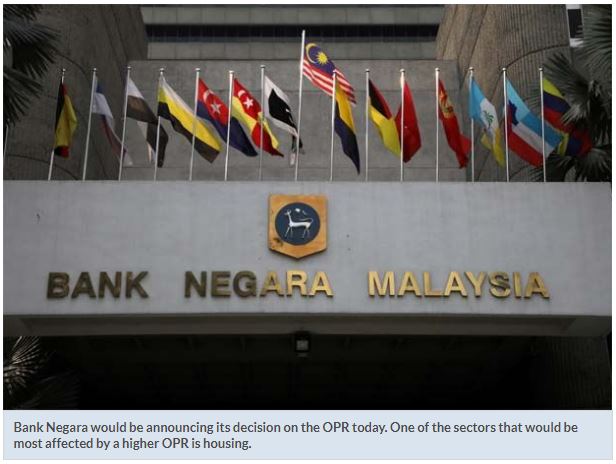Malaysia: Downside to aggressive hike
PETALING JAYA: Any attempt to raise the country’s benchmark interest rate too soon to pre-pandemic level may be detrimental to economic recovery.
Currently, the overnight policy rate (OPR) stands at 2%, following a 25-basis-point (bps) hike in May from 1.75%. Prior to the Covid-19 outbreak, the rate was at 3%.
Many economists are projecting at least a 50 bps OPR hike within the next six months, which would bring the policy rate to 2.5%.
However, they also cautioned that an aggressive increase in interest rate would dent consumer demand and stock market sentiment.
Bank Negara would be announcing its decision on the OPR today.
One of the sectors that would be most affected by a higher OPR is housing.
Amid persistent inflation, borrowers would have to incur higher monthly loan installments with the hike in OPR.
The question is, are borrowers ready to pay higher installments?
Malaysia University of Science and Technology economics prof Geoffrey Williams told StarBiz that even small increases in borrowing costs would have a big effect on spending and welfare.
“For existing mortgages with variable interest rates, a 1% increase in interest rates on a RM400,000 loan increases repayment by around RM110 per month or RM1,320 per year.
“Interest rate hikes also make all new mortgages more expensive and so, it would hit the demand for new loans and new house sales.
“Together, this hits the housing market as well as new house start-ups,” he said.
A reduced appetite in property purchase would weigh down the loan growth for banks, which is often seen as a catalyst for consumer demand and economic growth.
Bank Islam Malaysia Bhd chief economist Mohd Afzanizam Abdul Rashid also said a hike in OPR would have a knee-jerk effect on potential house buyers, especially the first-timers.
“The comparison that they would make before and after OPR hike in respect to monthly repayment would make them rethink their decision to buy a house.
“Maybe they would delay it for a little bit of time,” he said.
Eventually, Mohd Afzanizam said many of the buyers would still buy the desired units, as they adapt to higher borrowing costs.
A day earlier, Maybank IBG Research chief economist Suhaimi Ilias said that mortgage repayment would rise by 3%, for every 25 bps hike in OPR.
He also noted that real gross domestic product (GDP) growth would be slashed by 0.2 percentage points over 12 months, for every 25-bps hike in OPR.
According to a recent poll by Reuters, Bank Negara is likely to raise rates by another 25 bps.
All 22 economists in the June 27-July 1 poll forecast rates to rise by another 25 bps to 2.25% at the July 5-6 meeting. The central bank last raised rates twice in a row in mid-2010.
Mohd Afzanizam also said that a continued hike in OPR would affect stock market sentiment.
“This is due to the notion that excess liquidity is being mopped out from the system.However, higher OPR policies are built on premise to make the country more resilient to future shocks. I think eventually the market would appreciate that and reward it for being bold and right,” he said.
Over the longer term, Mohd Afzanizam opined that higher OPR would induce a more effective use of capital among the listed firms.
“In that sense, companies that have the right strategy and clarity in capital management would be rewarded by the investors,” he said.
Bank Negara is in a tight spot as it has to address the persistent inflation issue and the global race to unwind cheap monetary policy.
Local price pressure has been rising, with headline inflation in May hitting 2.8%. Without subsidies, a minister said the inflation rate would have hit 11.4%. Food inflation jumped to 5.2% in May, which is the highest level since November 2011.
However, Williams said raising interest rates would not bring price pressures down because the higher prices were restricted to fuel, food and related items like hotels and restaurants.
“In fact, interest rate hikes will raise costs across the board and could be passed on to the consumers in the form of higher prices causing a general inflation. The price pressure we have at the moment is due to supply restrictions and increased costs for companies.
“If consumer demand falls, companies will hold back products because they have lower sales,” he said, adding that the interest rate hike in May did not stop the ringgit’s depreciation and it had “very little effect” in reducing imported inflation.
Williams pointed out that Malaysia’s inflation level was low compared to other countries due to price controls and subsidies.
“This is the correct policy. There is no particular reason to use higher interest rates to try to control food and petrol prices,” he said.
Instead of focusing on raising OPR, Williams said the country should be more aggressive on supply-side reforms, opening up local competition and allowing more import opportunities.
“We need to break up monopolies, oligopoly and market dominance. We also need to remove restrictions on licences, permits and concessions that allow an anti-competitive situation to arise,” he said.
The goal to increase the interest rates is to ensure that the OPR is aligned with the current of the economy and to build policy space for future shocks, according to Mohd Afzanizam.
“At the prevailing OPR level, the rate of interest is already negative. Savers would be worse off if they keep their money in the low risk assets such as deposits.
“This would result in excessive risk taking activities as savers would need to compensate for the loss in their purchasing power due to inflation,” he added.
Source: https://www.thestar.com.my/business/business-news/2022/07/06/downside-to-aggressive-hike


 English
English







